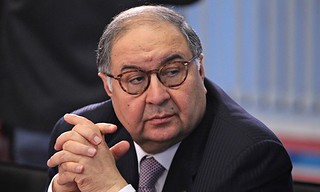
PREV ARTICLE
NEXT ARTICLE
FULL ISSUE
PREV FULL ISSUE
BILLIONAIRE BOUGHT WATSON’S GOLD NOBELLast week we reported that James Watson’s gold Nobel prize medal brought a whopping $4.75 million, far in excess of the recent $2
million price for Francis Crick's Nobel. So who bought it? The Guardian published the answer on December 9, 2014. -Editor
Alisher Usmanov, the Russian entrepreneur, paid $4.1m (£2.6m) for the medal at an auction at Christie’s in New York city last week, but said he will return it to Watson, who with Francis Crick and Maurice Wilkins, shared the 1962 Nobel prize in medicine for discovering the double helical structure of DNA. Usmanov, whose steel, mining and other assets are worth $15bn according to Forbes, said he wanted the medal to remain with its rightful owner and for the money he spent on the item to be donated to scientific research. "In my opinion, a situation in which an outstanding scientist has to sell a medal recognising his achievements is unacceptable," Usmanov said in a statement. "James Watson is one of the greatest biologists in the history of mankind and his award for the discovery of DNA structure must belong to him," he added. Watson became the first living laureate to auction his Nobel medal in a sale that earned far more than the $3m that some experts had predicted. Last year, the family of Francis Crick, who died in 2004, sold his medal for $2.27m.
After the unusual intervention, Usmanov said that Watson could now keep the medal but donate the proceeds of the sale to the research institutions that had "nurtured him", including the universities of Cambridge, Chicago and Indiana. "Dr Watson’s work contributed to cancer research, the illness from which my father died. It is important for me that the money that I spent on this medal will go to supporting scientific research, and the medal will stay with the person who deserved it. I wouldn’t like the medal of the distinguished scientist to be an object on sale," Usmanov’s statement said. Was the buyer of Francis Crick's Nobel an underbidder for the Watson medal? That could explain why the price was driven so high.
It only takes two deep-pocketed bidders to create a new record price. What does this mean for the market? Are the days of gold Nobels selling for
under seven figures a thing of the past? -Editor
To read the complete article, see:
To read the earlier E-Sylum articles, see:
Wayne Homren, Editor The Numismatic Bibliomania Society is a non-profit organization promoting numismatic literature. See our web site at coinbooks.org. To submit items for publication in The E-Sylum, write to the Editor at this address: whomren@gmail.com To subscribe go to: https://my.binhost.com/lists/listinfo/esylum All Rights Reserved. NBS Home Page Contact the NBS webmaster 
|

